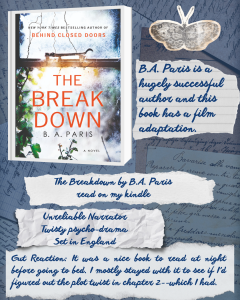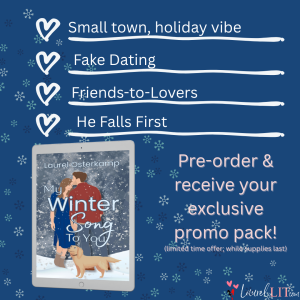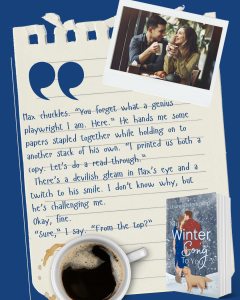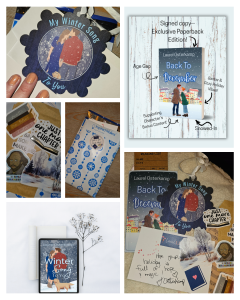Laurel Osterkamp's Blog: Laurellit.com
November 21, 2025
Book Journal: The Breakdown by B.A. Paris
The Breakdown, by B.A. Paris is a psychological, domestic thriller about a woman who can’t trust anyone, not even herself. When the story begins, Cass is about to drive home from an end-of-school-year-celebration with her fellow teachers. It’s about to storm, and her husband, who’s home with a migraine, makes her promise not to take the country road back; he wants her to stay on the busy, well-lit streets. But the rain starts to pour, and Cass makes the last minute decision to detour onto the country road after all. Cass encounters a vehicle with a woman sitting inside, who looks like she needs help. Cass drives up next to her, expecting the woman to get out and ask for assistance. When she doesn’t, Cass is worried it might be a trick, and concerned for her own safety, Cass drives home.
Well, the next day, it’s all over the news. A woman was murdered on that country road. When Cass discovers that the woman she could have helped is dead, she’s flooded with guilt. But it gets worse–turns out the woman was a new friend of Cass’s.
Of course, Cass can’t tell anyone, including her husband, that she drove past the woman’s car. Because in these novels, keeping secrets like that are the backbone of the plot. But it starts to strain credulity that Cass would keep such a secret, or that she wouldn’t tell even her best friend.
Also, Cass’s mother had early onset dementia. When Cass is overcome with remorse over her new friend’s death, she starts to forget things and it leads to a breakdown.
The book was fine. Entertaining enough to keep me reading to the end, and the writing was tight yet descriptive. However, I saw the “twist” coming from miles away, and I’m not always the best at figuring out where a plot is going. Plus, Cass could be very frustrating. Even when the mystery is over and she’s supposed to have grown, she’s still, well, frustrating. But the fact that it’s set in England and that there were enough surprises to keep me invested made The Breakdown worth reading.
Buy The Breakdown on Amazon
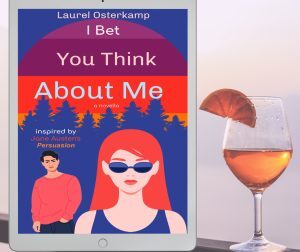

The post Book Journal: The Breakdown by B.A. Paris first appeared on LaurelLit.com.
The post Book Journal: The Breakdown by B.A. Paris appeared first on LaurelLit.com.
November 20, 2025
Five Overused Tropes Writers Should Avoid
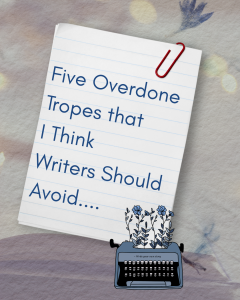
Recently, an author friend of mine was miffed when a line from his novel got edited out: I released a breath I didn’t know I was holding.
“Sure,” I told him. “Everywhere in social media, readers hate that line. They think it’s overused and cliche.”
Another thing that’s overused? Tropes.Authors employ them to add interest, depth, and familiarity to a story. Except, some readers see tropes as cheating – a way to quickly provide exposition without adding any substance. Or, they might feel manipulated by tropes – like they should have a strong and specific emotional reaction.
What can you do?
I’m not suggesting that we should stop using tropes altogether.
Just be aware of these five overdone tropes that I think writers should avoid.Here they are:
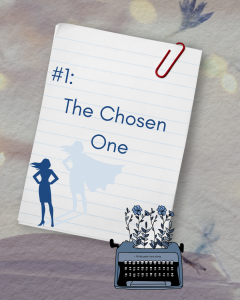
In many fantasy and science fiction stories, the main character is believed to have special powers or abilities, making them the only one who can save the world from destruction. Think Harry Potter, The Hunger Games, and The Matrix. While this trope can be effective in creating a sense of destiny and purpose for the main character, it’s been overused to the point of predictability.
Think about it: The main character is an underdog who discovers their extraordinary abilities and goes on a journey to defeat a powerful enemy. While they’re a reluctant hero, there’s never any doubt that they’ll step up and ultimately prevail.
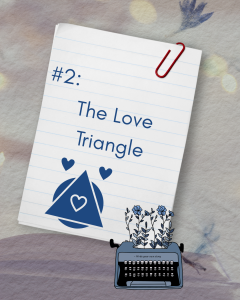
The love triangle is a staple in many romances and YA. It involves romantic relationships between the main character and two potential love interests, creating tension and conflict. Think Twilight, The Vampire Diaries, and The Selection series. The main character is torn between two love interests who have different personalities, resulting in struggle and a difficult decision. The problem is that readers can often predict the outcome of the love triangle from the beginning.
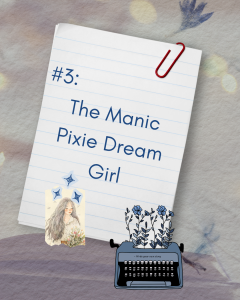
The Manic Pixie Dream Girl is a female character who is eccentric and free-spirited. She serves as a catalyst for the male protagonist’s personal growth. Think Garden State, 500 Days of Summer, Silver Linings Playbook, and many of John Green’s novels. While this trope may seem charming and quirky at first, it’s also become overused, unrealistic, and problematic.
The Manic Pixie Dream Girl trope reduces female characters to mere plot devices rather than fully fleshed out individuals with their own goals and motivations. Also, these “girls” (never women) usually struggle with their mental and/or physical health, but that’s not anything that’s dealt with in the story in a meaningful way. I have some very strong opinions about this trope, and you can read about them in past posts, “The Myth of the Manic Pixie Dream Girl,” and “Young, Beautiful, and on Her Way Out.”
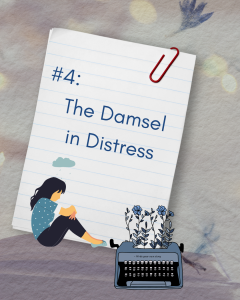
A damsel in distress is a female character who must be rescued by a male hero. Think any classic fairy tale, many of Colleen Hoover novels, and the Outlander series. This trope isn’t used very often anymore. Even Disney tries hard to give their female characters agency. That’s so they won’t send a harmful message to young readers, particularly young girls, that they are incapable of being strong and independent.
Furthermore, this trope also reinforces gender stereotypes, with the male hero as the brave savior, while the female is reduced to a passive and helpless victim. It also limits the potential for capable female characters, as they are often reduced to one-dimensional roles in the story.
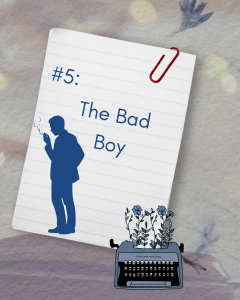
The bad boy is brooding, rebellious, and irresistible to women. Think Fifty Shades of Grey, Gossip Girl and Wuthering Heights. But the bad boy trope romanticizes toxic and unhealthy relationships. He’s dangerous and mysterious; she wants to save or fix him. This not only perpetuates the idea that women can change men, but it also normalizes abusive behavior. Thinking that love can fix someone’s flaws, or that a person’s bad behavior is excusable if they are attractive and charming, is not okay.
Just remember, that while tropes are useful tools for writers, when overused, they detract from the story’s impact. Readers want us to keep our stories fresh, original, and meaningful. Breaking away from these tropes is a first step toward doing just that.


The post Five Overused Tropes Writers Should Avoid first appeared on LaurelLit.com.
The post Five Overused Tropes Writers Should Avoid appeared first on LaurelLit.com.
November 16, 2025
Book Journal: Doll Parts by Penny Zang
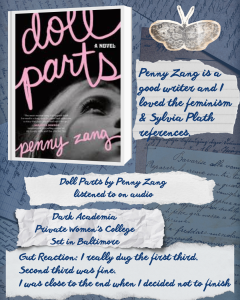
Doll Parts by Penny Zang started out very promising. I was excited to discover it. One of my favorite authors, Ashley Winstead, gave it a great blurb. Once I found out it was about 90s grunge era girls who obsess over Sylvia Plath, I was on board. I was even more excited that the there was a feminist angle, and Zang was providing commentary about how we, as a society, fetishize young women who die. (That’s something I wrote about earlier this year here on Laurellit, in my post, “Young, Beautiful, and On Her Way Out.“)
Anyhow, at some point the novel started going downhill for me. It wasn’t because Penny Zang’s writing is bad–quite the opposite. Her characterization, imagery, figurative language and details were all very well done and impressive. It had to do with the plot. First, the most likeable character is dead, and we hear from her through flashbacks. That made me less invested.
More importantly, there were one too many incredible coincidences that involved secondary characters being related to each other. When the second one was revealed, it was just to outrageous for me to buy. And I stopped listening, even though I was close to the end.
It’s rare for me to post a negative review because I like to support fellow authors. And I wouldn’t even call this review negative. In fact, if outrageous coincidences don’t bother you, I recommend Doll Parts, especially if you enjoy dark academia with a feminist flare.
See Doll Parts on Amazon


The post Book Journal: Doll Parts by Penny Zang first appeared on LaurelLit.com.
The post Book Journal: Doll Parts by Penny Zang appeared first on LaurelLit.com.
November 6, 2025
My Winter Song to You (Sneak Peek)
I’ll admit it–I’m a theater geek, through and through. Not just that, but while I was growing up, my BFF and I DELIGHTED in writing short stories, scripts, or the beginnings of novels we’d never finish, and laughing our heads off while we read them out loud. That’s why Chapter 18 of My Winter Song to You was my favorite chapter to write. The joy Max takes in his “script” was something I could totally connect with.
So, without further ado, here’s the preview chapter of My Winter Song to You.
(At the bottom, you’ll find pre-order info, including the amazing promo package of book goodies you can score, but only through November 13th!)

It’s Thanksgiving morning. Right before meeting Max for coffee, I decide that my outfit is all wrong. So, I swap my designer leggings for a pair of low-rise boot-cut Levis I left behind when I went off to NYU. They fit like they’ve been waiting for me. Of course, I also throw on my snowflake scarf.
I find Max outside Howl Coffee’s entrance, scuffing his feet on the sidewalk, breathing in the scent of roasting coffee and baked goods. I sneak up behind him, my steps silent. “Boo!” I shout, poking his ribs.
He jumps, then clutches his heart and groans. “You trying to kill me, Mork?”
“No,” I answer, “just surprise you.”
“Mission accomplished.”
“Sorry,” I reply. “What’s that heavenly smell?”
“Scones.” He leans in and takes my hand, his fingers entwined with mine. “Howl Coffee’s latest specialty. They were even written up in Southwest magazine.”
We’ve talked about this. Not the scones, but the public displays of affection. We decided that, starting today, we’ll act like a couple in public.
“Cool.” I meet his gaze—those dark brown eyes are too knowing and too unreadable all at once. A dimple appears when he smirks, and his face is half in shadows in the late-November light.
“Let’s go in. I need caffeine, and you need practice,” he says, pulling the door open.
“Practice at what?” I ask.
“Isn’t it obvious?” Max rolls his eyes. “At being a good girlfriend—one who doesn’t mow down her boyfriend before he sees her coming.”
“Oh, that.”
Max holds open the door for me, and together we walk into Howl Coffee.
Inside, Howl is the opposite of New York’s frenzied cafés. It smells like a Christmas tree farm, probably because every available inch is adorned with pine garlands strung with fairy lights. A wistful violin version of “I’ll Be Home for Christmas” swells through the speakers. Locals discuss town gossip while the baristas move at geological speeds. Max orders us two Americanos and two scones.
We pick a table by the window, where we can look out at downtown Sugar Pine. Already, the streetlamps are decorated with ribbons and wreaths. Max takes out some papers, flipping through pages until he finds a section marked with a yellow sticky note.
“What is all that?” I ask.
Max peers at me over the paper’s edge and arches an eyebrow. “I wrote you a monologue.”
“For Bohemian Winter?”
He shakes his head. “No, Mork. This script is you and me, confessing our love over Thanksgiving dinner. Of course, I had to guess how our families would react. While I’m sure there will be a few wild cards, I think I know everyone pretty well.” He grins, self-satisfaction oozing out. “But the important part is that you get the starring role. The most lines!”
Ripping a brown paper sugar packet open, I pour and stir it into my coffee. “Wow. Thanks, I guess. But I thought we were joking about rehearsing our lines. I mean, sure, let’s have a rough plan for what we’ll say, but you actually scripted it out?”
Max chuckles. “You forget what a genius playwright I am. Here.” He hands me some papers stapled together while holding on to another stack of his own. “I printed us both a copy. Let’s do a read-through.”
There’s a devilish gleam in Max’s eye and a twitch to his smile. I don’t know why, but he’s challenging me.
Okay, fine.
“Sure,” I say. “From the top?”
He nods. “That’s the best place to start. Now, I’ll read all the male roles—your dad, my dad, Nate, and of course, myself. You read all the females. Got it?”
“No. This is way too confusing. Explain it to me again?”
He waves his hand like he’s swatting away my sarcasm. Then, after clearing his throat, Max begins, spouting a line he’s assigned to himself. “Happy Thanksgiving, everyone. Mork and I are so glad we could all be together today.”
The next line belongs to Max’s mother. So, I read, “Ah, sweetie. We’re all glad to be together too.” Then I lower my voice a bit to sound like Eleanor. “I agree! Plus, this turkey is delicious, and I must get your recipe for the sweet potato casserole.” I look at Max and break from the script. “My grandmother hates sweet potato casserole.”
Max screws up his face in shock. “How is that even possible? With the tiny marshmallows? It’s like dessert for dinner!”
“Exactly. She doesn’t like mixing sweet with savory. After all the time you’ve spent with Eleanor, how can you not know that?”
He sighs. “Whatever. Just skip to the bottom of page two.”
I roll my eyes but do as he directed, flipping the page over.
“We’ll start with my line,” Max says. Then he launches in. “This seems like the perfect time to share some exciting news. I know you all have wondered over the years why Mork and I never hooked up and became a couple—”
According to Max’s script, I’m supposed to break him off in an “excited and breathless” tone of voice. When I don’t, his eyes grow large and impatient. “Whenever you’re ready,” he whispers, as if we’re actually onstage.
“Is this the part where I break into song?” I whisper back.
“Ha-ha. If you don’t follow the script, Mork, I just might put your lines to music.”
“Fine.” The fake-dating thing was my idea and Max is complying to make me happy. I take a deep breath. “Max!” My forced excitement snags the attention of other coffee shop patrons. “Since this is a day to be thankful, why don’t we share our news?”
Max slaps his hand over his mouth, trying to restrain a grin. But it’s so wide that it takes over his entire face.
I glare at him, but keep at it. “Everyone will find out sooner or later, and I just can’t hold it in. I’ve been in love with Max forever! I kept hoping he’d feel the same way. That he might overlook my annoying habits and weird personality quirks, like how I insist that Barry Manilow’s music should be made into a Broadway musical like ABBA’s Mamma Mia! And how I collect sample-sized shampoo bottles and keep them on my shelf like they’re trophies. Let’s face it, that is odd!”
Max holds his papers up to his face, hiding. But I can tell he’s shaking with silent laughter. So, I go off script.
“Nevertheless,” I continue, “We all know Max has quirks of his own. I mean, he pronounces ‘specifically’ as ‘pacifically’ and gets mad when you correct him, and he keeps packets of hot sauce in his wallet the same way other guys have packets of condoms.”
Max slaps the table. “When was the last time you saw the inside of my wallet, Mork?”
I mimic his table slap. “When was the last time you saw my shampoo shelf, Max?”
“Point taken,” he huffs. “Keep reading and no more improvising.”
“You’re bossy,” I mumble. To get back into character, I imagine Eleanor and my mom hanging on the edges of their seats during Thanksgiving dinner. “Anyway,” I recite, “here’s the fantastic news. I have convinced Max to date me! This hunky guy has been mine ever since I got back into town. All those times when we were ‘working on the script,’ we were actually having sex! Safe to say, it’s getting serious.”
I stare at Max, torn between mortification and surprise that he’s taken this so far. His chin trembles as he fights his obvious glee. How am I supposed to recognize his genius as a songwriter/playwright when I’m so busy recognizing him as a total jerk?
I take a sip of coffee. “No way am I telling your mom that we’ve been having sex.”
Laughter bursts out of him. “Come on, Mork. We have to make it seem real.” Max flips through the pages. “Besides, where’s your sense of adventure?”
My clever retort doesn’t materialize, and Max starts thinking out loud. “What if I say, ‘We were going to wait to go public, but we couldn’t stand keeping this secret any longer.’”
I open my mouth to interrupt, but he’s on a roll. “Then Nate will look at my mom and say, ‘You owe me twenty bucks. Didn’t I tell you they’d get together?’ And Eleanor will be like, ‘Well, well, well…’” Max draws out Eleanor’s line like she’s Maggie Smith in Downton Abbey.
“Perhaps we’re overthinking it?”
Max scowls and pops a bite of scone into his mouth. “Go on,” he says, pointing at the script while chewing.
“If we come in sounding too rehearsed, they’ll know something is up. I say we ditch your script and just plan some talking points.”
“Fine.” Max lets out a huge, mock-dramatic sigh, like I’m asking for the world. He reaches into his bag for a pen and turns the pages of his script over so the one facing up is blank. “I’ll take notes.”
I reach forward and swipe his pen away.
“Hey!” he yells. “I was using that!”
“No more notes, no more written-out lines. Just you and me, talking. Like how a boyfriend and a girlfriend would.”
Max’s shoulders tense. For the first time today, his indignation seems real, not performative. I soften my voice. “Please, Max? I know this is awkward, and I don’t blame you for using humor as a defense. That’s what you do when things get uncomfortable, and what could be more uncomfortable than pretending you’re in love with me? Especially since we’ll be lying to everyone we care about most? Just—do this for me, and I promise, I’ll make it up to you.”
His shoulders relax. So does his face. “Sure, Mork,” he whispers.
“Okay, then,” I say. “How about we begin with me saying that we have news…”
Max and I go back and forth, forming a plan. Our ideas aren’t terrible. I just hope everything works out the way that we want it to. The way that it should.

My Winter Song to You will be released on November 13th. If you pre-order the eBook, or if you order the paperback on the release day, I will send you a bunch of wonderful book goodies. But make sure you fill out this form so I’ll know who to send them to.
The post My Winter Song to You (Sneak Peek) first appeared on LaurelLit.com.
The post My Winter Song to You (Sneak Peek) appeared first on LaurelLit.com.
October 1, 2025
Swiftature–Top Fifty Taylor Swift Songs for Fiction Writers Ranked: 10-1!!!
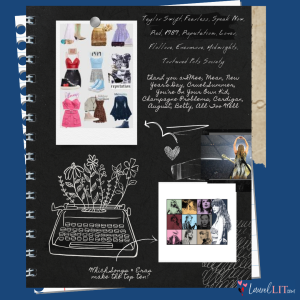
It’s finally here! What we’ve all been waiting for–for weeks! The release of Life of a Showgirl!!
Oops–no. Sorry. That’s not for another day. Which is why I HAVE TO post my top ten Taylor Swift Songs for Fiction Writers today. I created my list months ago, and it’s taken me this long to post it all. Who knows how the list might change though, after Life of a Showgirl is released?! If it does, I will make updates. But for now, here are the winners…
#10 thanK you aIMee
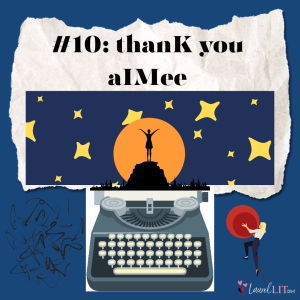
All that time you were throwing punches
It was all for nothing
And our town, it looks so small from way up here
Screamed, “Thank you, Aimee” to the night sky
And the stars are stunning…
‘So I pushed each boulder up that hill
Your words were still just ringing in my head, ringing in my head
Thank you, Aimee
If you’re at all invested in Taylor Swift’s personal life or the stories behind her songs, you know this one is directed toward Kim Kardashian—or at least, that’s what her fans assume. To me, it’s the least interesting part of “thanK you aIMee.” I included this song in my top ten because it’s like a culmination of a hero’s journey to self-discovery. Throughout, she alludes to Sisyphus, pushing the boulder up the hill. Only unlike the tragic, permanently defeated Sisyphus, Taylor gets herself and the boulder up the hill, and discovers the benefits of her struggle. She finds a way to heal and gains new perspective. Whoever Aimee is in real life, in the song, she can represent any number of demons. And the struggle isn’t just external, but internal as well. It’s the ultimate victory, where the reward is hard-earned and cathartic.
#9 Mean
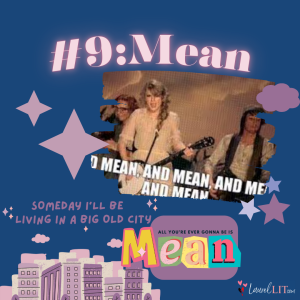
You
are pointing out my flaws again
as if i dont already see them
i’ll walk with my head down
trying to block you out
cause i’ll never impress you
i just wanna feel okay again
i bet you got pushed around
somebody made you cold
but the cycle ends right now
cause you cant lead me down that road
and you dont know what you dont know
That’s right. “Mean” earns a place in my top ten at #9—and the reason has nothing to do with writing, at least not when it comes to the elements of fiction. However, if you’ve been putting yourself and your books out there, it’s sorta inevitable that one day, you’ll get a mean reader review. One that hits below the belt and feels amazingly personal. Because writing fiction is a personal process. You’re laying bare the inner workings of your mind, and nothing hurts like someone ripping into a book you’ve poured your heart and soul into. But when that happens, you ABSOLUTELY cannot respond. There are horror stories about writers who responded to negative reviews that they got on Goodreads, and it’s just a VERY. BAD. IDEA.
Here’s what I suggest instead. Buy a punching bag (if you don’t already have one.) Put on your gloves and put in your earbuds. Punch out all your aggression while listening—and maybe even singing along—to Taylor Swift’s “Mean.” And then, move on.
#8: New Year’s Day
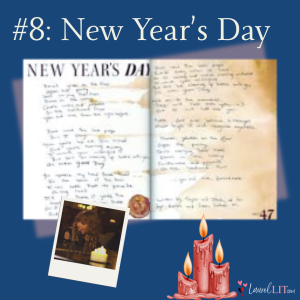
P lease, don’t ever become a stranger
Whose laugh I could recognize anywhere
There’s glitter on the floor after the party
Girls carryin’ their shoes down in the lobby
Candle wax and Polaroids on the hardwood floor
You and me forevermore
Don’t read the last page
But I stay when it’s hard or it’s wrong or we’re makin’ mistakes
I want your midnights
But I’ll be cleanin’ up bottles with you on New Year’s Day
“New Year’s Day” is a quiet, seemingly simple love song with a minimalist feel. Taylor sets the stage by using details—glitter, candle wax, and Polaroids littering the hardwood floor after their New Year’s Eve party. But it makes a subtle shift to promises and pleas: don’t ever become a stranger whose laugh I could recognize anywhere (so beautiful) and I want your midnights, but I’ll be cleaning up bottles with you on New Year’s Day. This song is the opposite of showy. Other than imagery, Swift doesn’t employ language devices. But it communicates an understated yet powerful message of love that’s so pure, I wish I could include something like it in everything I write.
#7: Cruel Summer
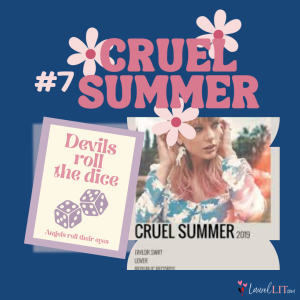
Fever dream high in the quiet of the night
You know that I caught it (oh yeah, you’re right, I want it)
Bad, bad boy, shiny toy with a price
You know that I bought it (oh yeah, you’re right, I want it)
Killing me slow, out the window
I’m always waiting for you to be waiting below
Devils roll the dice, angels roll their eyes
What doesn’t kill me makes me want you more
And it’s new, the shape of your body
It’s blue, the feeling I’ve got
And it’s ooh, whoa-oh
It’s a cruel summer
“Cruel Summer” is full of contradictions. Summer, which is supposed to be easy and kind, is cruel, full of devils and danger. Swift sings “I snuck in through the garden gate, every night that summer just to seal my fate…” She’s resigning herself to a toxic relationship, where he wants to keep things light, and keep her a secret. The song is poppy and fun, yet the lyrics put things on an epic scale, like she might just lose her soul (or her heart) in pursuit of this man. It tells the story of unrequited love where the stakes are super high. Such suspense! Such a great way to foster reader engagement!
#6: You’re on Your Own, Kid
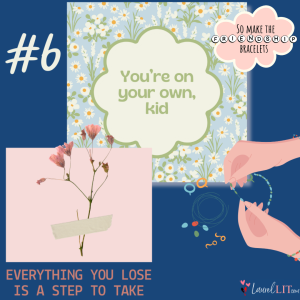
From sprinkler splashes to fireplace ashes
I gave my blood, sweat and tears for this
I hosted parties and starved my body
Like I’d be saved by a perfect kiss
The jokes weren’t funny, I took the money
My friends from home don’t know what to say
I looked around in a blood-soaked gown
And I saw something they can’t take away
‘Cause there were pages turned with the bridges burned
Everything you lose is a step you take
So make the friendship bracelets
Take the moment and taste it
You’ve got no reason to be afraid
You’re on your own, kid
“You’re On Your Own, Kid” is the ultimate coming-of-age song. It’s about finding your voice and establishing your independence. Staying connected with friends while being okay alone. Letting go of crushes and loving yourself. Living in the moment and living strong. This is the song that inspired Swifties’ preoccupation with friendship bracelets—a seemingly throwaway line in a song “from the vault.” But it only demonstrates the power of her lyrics. They tap into something personal and universal. Every time I hear this song, I feel a sense of triumph. It’s what I try to insert into every protagonist’s character arc.
#5 Champagne Problems
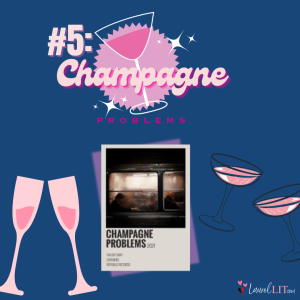
You booked the night train for a reason
So you could sit there in this hurt
Bustling crowds or silent sleepers
You’re not sure which is worse
Because I dropped your hand while dancing
Left you out there standing
Crestfallen on the landing
Champagne problems
Your mom’s ring in your pocket
My picture in your wallet
Your heart was glass, I dropped it
Champagne problems
You told your family for a reason
You couldn’t keep it in
Your sister splashed out on the bottle
Now no one’s celebrating
Dom Pérignon, you brought it
No crowd of friends applauded
Your hometown skeptics called it
Champagne problems
You had a speech, you’re speechless
Love slipped beyond your reaches
And I couldn’t give a reason
Champagne problems
Your Midas touch on the Chevy door
November flush and your flannel cure
“This dorm was once a madhouse”
I made a joke, “Well, it’s made for me”
How evergreen, our group of friends
Don’t think we’ll say that word again
And soon they’ll have the nerve to deck the halls
That we once walked through
One for the money, two for the show
I never was ready, so I watch you go
Sometimes you just don’t know the answer
‘Til someone’s on their knees and asks you
“She would’ve made such a lovely bride
What a shame she’s fucked in the head, ” they said
But you’ll find the real thing instead
She’ll patch up your tapestry that I shred
And hold your hand while dancing
Never leave you standing
Crestfallen on the landing
With champagne problems
Your mom’s ring in your pocket
Her picture in your wallet
And you won’t remember all my
Champagne problems
You won’t remember all my
Champagne problems
I couldn’t pick just a portion of this song’s lyrics to represent how incredible it is, because the ENTIRE THING is pure poetry. Or, amazingly written prose in the form of flash fiction. Swift uses paradoxes, weaving in and out through the song, telling the story of a failed marriage proposal. She sings from the perspective of the “fucked-in-the-head” potentially lovely bride, describing how she broke her boyfriend’s heart. Somehow, in the space of three minutes, she establishes the setting and describes the reactions of friends and family to her rejection. And she includes how they’ll console him, their predictions of him finding “the real thing”–a woman to “patch up the tapestry I shred.”
This might be Taylor’s most well-written song, if you look at it line by line. It’s sort of like what Shakespearean scholars say about Macbeth—it’s his shortest play, and every word is necessary and well-chosen. But, just like Macbeth isn’t considered Shakespeare’s greatest play (that honor goes to Hamlet, or some would argue, King Lear), “Champagne Problems” isn’t Taylor Swift’s greatest song for fiction writers. It’s only #5.
Which me leads to #s 4 thru 2 in my list. They’re all basically tied because they’re all connected. My ranking really comes down to execution (like how catchy is the tune?) But here we go…
#4: Cardigan
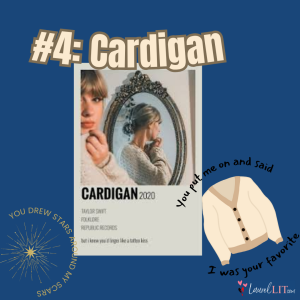
‘Cause I knew you
Steppin’ on the last train
Marked me like a bloodstain, I
I knew you
Tried to change the ending
Peter losing Wendy, I
I knew you
Leavin’ like a father
Running like water, I
And when you are young, they assume you know nothing
But I knew you’d linger like a tattoo kiss
I knew you’d haunt all of my what-ifs
The smell of smoke would hang around this long
‘Cause I knew everything when I was young
I knew I’d curse you for the longest time
Chasin’ shadows in the grocery line
I knew you’d miss me once the thrill expired
And you’d be standin’ in my front porch light
In Swift’s album Folklore, she tells the same story (of a high school love triangle) from three different perspectives. Each song has a single word title, starting with either a, b, or c. “Cardigan” is Betty’s story, about how her boyfriend, James, left her for another girl—but only for a while. She’s sure that he’ll come back to her. The similes & metaphors in this song are just perfect. “I knew you, leaving like a father, running like water…” and comparing herself throughout to an old cardigan under someone’s bed, but “you put me on and said I was your favorite.” The refrain is “When you are young they think you know nothing,” and the song builds to “I knew everything when I was young.” We get the sense that Betty is telling her story after many years have passed, and she now understands what she didn’t know then.
#3: August
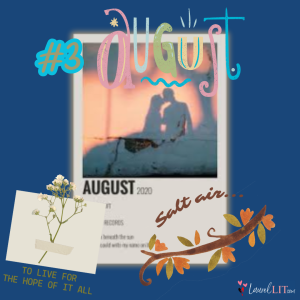
Back when we were still changin’ for the better
Wanting was enough
For me, it was enough
To live for the hope of it all
Cancel plans just in case you’d call
And say you meet me behind the mall
So much for summer love and saying, “Us”
‘Cause you weren’t mine to lose
You weren’t mine to lose, no
But I can see us lost in the memory
August slipped away into a moment in time
‘Cause it was never mine
And I can see us twisted in bedsheets
August sipped away like a bottle of wine
‘Cause you were never mine
The narrator in August doesn’t get a name. She’s the other woman who James drives off with, and they end up having a summer fling. She’s a temptress and possibly a villain. Except, after listening to the lyrics, you have to feel bad for her. The bittersweet longing communicated is both raw and refined. Lots of people have had an ill-fated love affair that they’ve tried to hang onto; lots of us haven’t. But most people understand the desire to stop time, and to cling to something (or someone) that cannot last. It’s like sand slipping through your fingers. August represents a perfect moment when the end is near. It’s a month full of Sundays, when you know that school will start soon and real life will resume. “August slipped away like a bottle of wine, cause you were never mine…”
#2: Betty
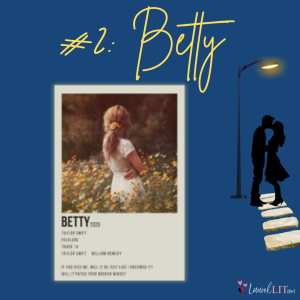
I was walkin’ home on broken cobblestones
Just thinkin’ of you when she pulled up like
A figment of my worst intentions
She said “James, get in, let’s drive”
Those days turned into nights
Slept next to her, but
I dreamt of you all summer long
Betty, I’m here on your doorstep
And I planned it out for weeks now
But it’s finally sinkin’ in
Betty, right now is the last time
I can dream about what happens when
You see my face again
The only thing I wanna do
Is make it up to you
My daughter thinks that “Betty” is an unlikely choice for my #2 spot. It doesn’t have the same poetry as “Cardigan” and “August,” so shouldn’t it be #4, if not further down the list? While I admit that the harmonica and country, folksy vibe of “Betty” is part of the reason why I love it so much, I have other reasons for making it my #2. Remember, this list is for fiction writers, and in “Betty” Swift achieves something that many seasoned novelists can’t. One, she writes in a convincingly male voice. Two, he’s an unreliable narrator who never apologizes or takes responsibility for the damage he’s done. And three, he becomes a compelling antihero who we root for in spite of ourselves. “Betty” is pure genius, and I believe it’s Taylor Swift’s most underrated song.
#1: All Too Well (10 Minute Version)
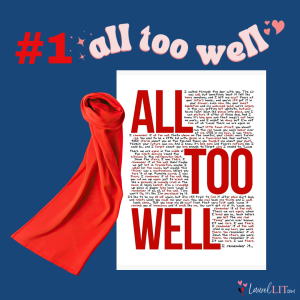
Was there every any doubt that “All Too Well” would be #1? I mean, come on—Swift actually went all meta and wrote another song about “All Too Well” where she describes its genesis and how the story is no longer hers. (I’m talking about “The Manuscript.”) “All Too Well” has its very own short film, where at the end, the protagonist writes a novel that’s supposedly about her song? It is a pop culture touchstone, and I’ll die on this hill: Not only is “All Too Well” Swift’s magnum opus, it’s a musical, lyrical masterpiece. The song follows the standard plot diagram flawlessly, with exposition, an inciting incident, rising action, a climax, and denouement. There’s character arcs and themes, setting, figurative language, and symbolism. (I mean—the red scarf?) The song screams of autumn, first love, and first heartbreak. It tells a story where it’s impossible not to get sucked in.
Okay, Folks. There you have it!
Please check back in a while, to see if any songs from Life of a Showgirl knocks any of my original choices for The Top 50 Taylor Swift Songs for Fiction Writers off the list. In the meantime, if you haven’t already, here are the posts for my first 41 choices (there’s a tie at #50.)
Read Top 50 Taylor Swift Songs for Fiction Writers, #s 50-41
Read Top 50 Taylor Swift Songs for Fiction Writers, #s 40-31
Read Top Taylor Swift Songs for Fiction Writers, #s 30-21
Read Top Taylor Swift Songs for Fiction Writers, #s 20-11
And, as a special treat, I created a Spotify Playlist of all 51 Top Taylor Swift Songs for Fiction Writers. Follow it here.
Also, make sure to read “Love and Poetry,” my short story written while reading Taylor Swift. It’s free to download, and you don’t even have to subscribe to my newsletter! (But if you’d like to subscribe, I’d love to have you. Click here!)
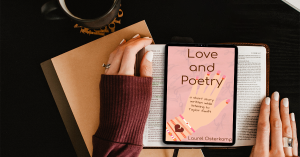
The post Swiftature–Top Fifty Taylor Swift Songs for Fiction Writers Ranked: 10-1!!! first appeared on LaurelLit.com.
The post Swiftature–Top Fifty Taylor Swift Songs for Fiction Writers Ranked: 10-1!!! appeared first on LaurelLit.com.
August 29, 2025
Swiftature — Top 50 Taylor Swift Songs for Fiction Writers Ranked: 20 -11
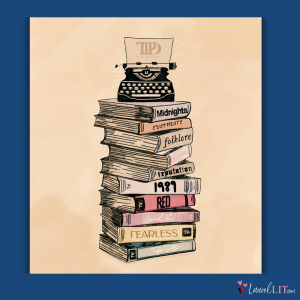
OMG — Taylor has a new album out soon, AND she’s engaged!!
It’s the perfect time to finally resume my series about the top 50 Taylor Swift songs for fiction writers. Honestly, I never meant to take this long, but I’ve been hard at work on a holiday romance I hope to release in a matter of weeks, and that came first. But my WIP is currently being looked at my developmental editors & beta readers, so here we are.
Taylor did me a solid by becoming “hot” again when the timing worked well for me. I’m sure she planned it this way…
Anyway, without further ado, here are my selections for songs 20 thru 11–the best Swift songs for fiction writers!
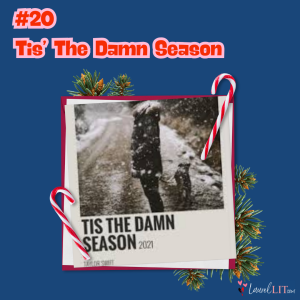
I parkеd my car right between the Methodist
And thе school that used to be ours
The holidays linger like bad perfume
You can run, but only so far
I escaped it too, remember how you watched me leave
But if it’s okay with you, it’s okay with me
“Tis’ the Damn Season” is at once bittersweet and nostalgic, telling the story of a woman who returns to her hometown over the holidays and reconnects with a lost love. Swift contrasts the aching freedom of escaping your childhood home with the security of staying with your roots. In the song’s refrain, she repeats, “The road not taken looks real good now,” using a literary allusion to Robert Frost’s famous poem. Swift seems to say here that she took the road less travelled by taking risks and rising to stardom. But that didn’t make “all the difference.” In fact, she seems to want to return to the safety of her childhood and this lost relationship. As always, the lyrics here are full of sensory details, similes, and literary tropes, making this feel almost like it could be a Hallmark Christmas movie. It certainly captures the essence of a ninety minute film into a three minute song.
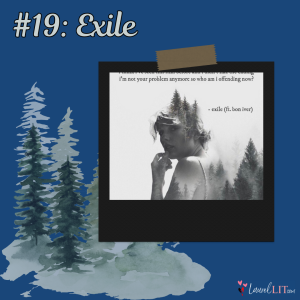
Second, third, and hundredth chances
Balancing on breaking branches
Those eyes add insults to injury
I think I’ve seen this film before
And I didn’t like the ending
I’m not your problem anymore
So, who am I offending now?
You were my crown
Now I’m in exile, seeing you out
Folklore is chock-full of angsty, melancholy, and emotionally devastating songs, many of which tell the story of lost love. And “Exile” may very well be the most angsty, melancholy and emotionally devastating song of them all. While listening to this duet, we witness an imaginary, post-breakup conversation between two people still mourning their past relationship. Taylor seems to have moved on more than Bon Iver, yet they both revisit their heartache, the destruction of their dreams and their inability to communicate with one another. Throughout the song there are metaphors, comparing their relationship to a film or to popular film tropes. There are also military or geographic metaphors, like “you were my town, now I’m in exile seeing you out,” or “you’re not my homeland anymore, so who am I defending now?” The result is poignant, creating a startling picture of this couple, their dynamic, and the downfall of their love.
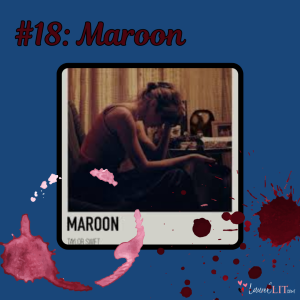
And I lost you
The one I was dancin’ with
In New York, no shoes
Looked up at the sky and it was maroon
The burgundy on my T-shirt when you splashed your wine into me
And how the blood rushed into my cheeks, so scarlet, it was (maroon)
The mark you saw on my collarbone, the rust that grew between telephones
The lips I used to call home, so scarlet, it was (maroon)
I’ve said it before—Taylor Swift loves color references to express emotions. The most notable example is her title track song, “Red,” which didn’t even make my top 50. (Nothing against the song, it’s great—but there were so many worthy songs to choose from…) Swifties claim that “Maroon” is a more mature version of the song “Red.” I like “Maroon” better for fiction writing because of all the details, and how she combines them to tell yet another story of a relationship. Her lyrics show an intense passion that, in the end, becomes destructive. References to blood, marks on her collarbone, rust between telephones, all paint a picture of a love relationship that becomes unhealthy.
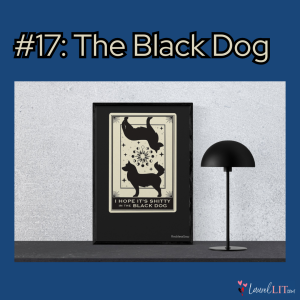
Six weeks of breathing clean air
I still miss the smoke
Were you making fun of me with some esoteric joke?
Now I want to sell my house and set fire to all my clothes
And hire a priest to come and exorcise my demons
Even if I die screaming
And I hope you hear it
And I hope it’s shitty
In The Black Dog
When Taylor Swift introduced TTPD during the Eras Tour, she branded it, “Female Rage—The Musical.” She was joking, but not completely. Swift has built an amazing career writing song after song about sad breakups, about being unlucky in love. But “The Black Dog” introduces something else; her rage turns to self-destruction. What a character arc! It’s not her ex’s clothes she wants to burn—it’s her own. “Now I want to sell my house and set fire to all my clothes,” suggests a detailed and deliberate combination of anguish and fury, one that Swift internalizes rather than acts out on.
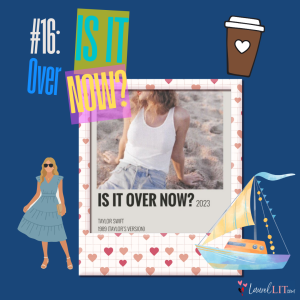
Oh, Lord, I think about
Jumping off of very tall somethings
Just to see you come running
And say the one thing I’ve been wanting, but no
Let’s fast forward to three hundred awkward blind dates later
If she’s got blue eyes, I will surmise that you’ll probably date her (no)
You dream of my mouth before it called you a lying traitor
You search in every model’s bed for something greater
The internet says this song is about Swift’s on-again/off-again relationship with Harry Styles. I give “Is it Over Now?” the number sixteen spot for its anthem-like power. It’s catchy and memorable, a reminder of that sometimes less is more when it comes to writing to draw the reader in. Plus, I love the line “lets fast-forward to three hundred takeout coffees later.” Another example of synecdoche! (An AP lit term meaning when a part represents the whole.)
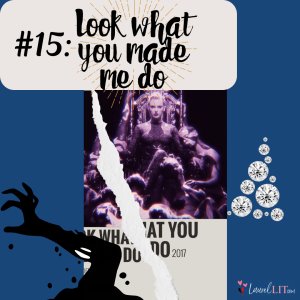
But I got smarter, I got harder in the nick of time (nick of time)
Honey, I rose up from the dead, I do it all the time (I do it all the time)
I got a list of names, and yours is in red, underlined
I check it once, then I check it twice, oh
Ooh, look what you made me do
This song is very straight forward, but if you want lots of Easter eggs and symbolism, just watch the music video. By now, Swift is well known for having “eras” but in 2017, it was still a new concept. “Look What You Made Me Do” is the perfect declaration of a new era, even going so far as saying that “the old Taylor” is dead. It reminds me of Gloria Gaynor’s “I Will Survive”–she’s been reborn into a smarter, harder version of herself. It’s the type of anthem we all need whenever we’re feeling angry or taken advantage of, expressing those universal emotions with flawless execution.
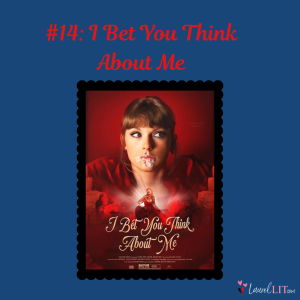
But you know what they say, you can’t help who you fall for
And you and I fell like an early spring snow
But reality crept in, you said we’re too different
You laughed at my dreams, rolled your eyes at my jokes
Mr. Superior Thinkin’
Do you have all the space that you need?
I don’t have to be your shrink to know that you’ll never be happy
And I bet you think about me
They say that comedy is tragedy plus timing. “I Bet You Think About Me” is a funny song about heartbreak, like the first three-fourths of a rom com (but minus the typical happy ending.) I love how she depicts the guy here, with his “organic shoes” and his “million dollar couch,” who says Swift must be insane because she wrote a song about him…it’s very meta. While she doesn’t use a ton of figurative language (though, I love “you and I fell like an early spring snow,) the details she provides are both snarky and striking. That’s why, for its ability to convey both character and voice, I give “I Bet You Think About Me”–a song from Red’s vault—the number fourteen spot.
*side note: I love this song so much that I used its title for my small-town, Austen-inspired, contemporary rom-com novella. AND YOU CAN READ IT FOR FREE! Here you go: Read I Bet You Think About Me
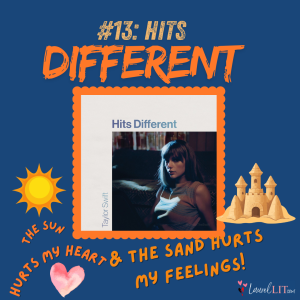
I used to switch out these Kens, I’d just ghost
Rip the Band-Aid off and skip town like an asshole outlaw
Freedom felt like summer then on the coast
Now the sun burns my heart and the sand hurts my feelings
And I never don’t cry (no, I never don’t cry) at the bar
Yeah, my sadness is contagious (my sadness is contagious)
I slur your name ’til someone puts me in a car
I stopped receiving invitations
I may have picked this song as number 13—Swift’s favorite number—solely because of the line, “Now the sun burns my heart and the sand hurts my feelings.” I also love how self-aware it is. This song is a portrait of a woman who’s unapologetic about falling apart over a guy who she knows isn’t worth her time. There’s something very refreshing about the attitude of not giving a fuck.
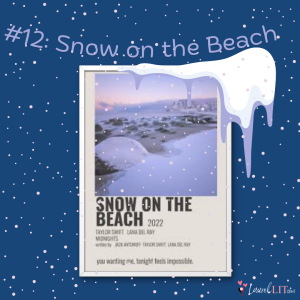
One night, a few moons ago
I saw flecks of what could’ve been lights
But it might just have been you
Passing by unbeknownst to me
Life is emotionally abusive
And time can’t stop me quite like you did
And my flight was awful, thanks for asking
I’m unglued, thanks to you
And it’s like snow at the beach
Weird but fuckin’ beautiful
Flying in a dream, stars by the pocketful
You wanting me tonight feels impossible
But it’s comin’ down, no sound, it’s all around
The entire song is a simile! It’s dreamy and ethereal, about a perfect moment when fate and love converge.
In Swift’s own words: “The song is about falling in love with someone at the same time as they’re falling in love with you…And you’re kind of looking around going, ‘Wait, is this real? Is this a dream?… Kind of like it would be if you were to see snow falling on a beach.”
“Snow on the Beach” inspired me while I was writing my novel, The Side Project. It’s a contemporary romance that takes place in Bemidji, MN, a northern town with a huge, beautiful lake. Snow on the beach is a common occurrence in Bemidji, and the song perfectly describes the type of love I was trying to capture.

I would’ve died for your sins
Instead, I just died inside
And you deserve prison, but you won’t get time
You’ll slide into inboxes and slip through the bars
You crashed my party and your rental car
You said normal girls were boring
But you were gone by the morning
You kicked out the stage lights but you’re still performing
And in plain sight, you hid
But you are what you did
And I’ll forget you, but I will never forgive
The smallest man who ever lived
The slow, careful build in “The Smallest Man Who Ever Lived” is masterful. It begins with quiet, probing questions and subtle accusations. But once Swift reaches the bridge, the devastation is sudden and inescapable. I love this song for fiction writers because the groundwork is laid out in the beginning, building to climax that we’re unaware of. But once we arrive, it’s both shocking and inevitable. Also, Swift uses paradox, irony, hyperbole and zeugma (using the same verb in two different ways) with effortless skill.
Okay! Now we only have the top ten left. I’m going to make any promises about when I’ll post them, except that it will be before early October. Because, who knows how my selections might change after Life of a Showgirl releases?
In the meantime, if you haven’t already:
Read Top 50 Taylor Swift Songs for Fiction Writers, #s 50-41
Read Top 50 Taylor Swift Songs for Fiction Writers, #s 40-31
Read Top Taylor Swift Songs for Fiction Writers, #s 30-21
Also, make sure to read “Love and Poetry,” my short story written while reading Taylor Swift. It’s free to download, and you don’t even have to subscribe to my newsletter! (But if you’d like to subscribe, I’d love to have you. Click here!)

The post Swiftature — Top 50 Taylor Swift Songs for Fiction Writers Ranked: 20 -11 first appeared on LaurelLit.com.
The post Swiftature — Top 50 Taylor Swift Songs for Fiction Writers Ranked: 20 -11 appeared first on LaurelLit.com.
June 20, 2025
Need Some Author Motivation? This Will Help, Especially If You’re Indie!
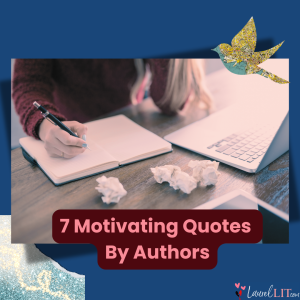
Writing a book and putting it out there takes a lot of courage, hard work, and dedication. You pour your heart and soul into your novel, hoping that it will be a big hit. Unfortunately, with thousands of books published every day, an author’s road can be long and winding. Sometimes it’s hard to stay motivated and keep writing.
So, let’s explore some tips for how not to give up on your writing and publishing journey. (And if you don’t want to take my word for it, check out my famous author quotes!)
Remember Why You’re Doing It
You have stories to share with the world. It’s your main motivation for writing, and don’t forget that. Remember the joy and satisfaction that comes from creating a world and characters, and how much fun it is.
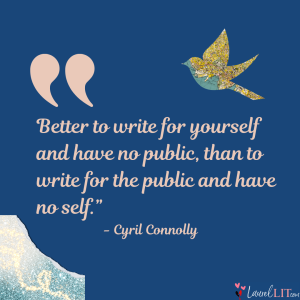
Focus on the Process, not the Outcome
Yes, it’s important to market and promote your book, but don’t let it consume you. Even when sales are low and readers are few, you’re still learning something every day, and you still get fulfillment from crafting a story.
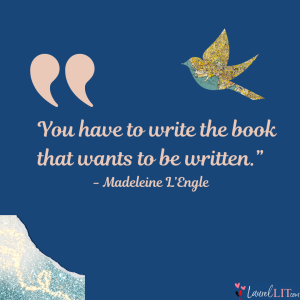
Set Realistic Goals
It is easy to get caught up in the numbers and compare yourself to other, more successful authors. But remember, everyone’s journey is unique, and success looks different for everyone. Goals like writing a certain amount of words per day, or finding one new reader per week, are attainable.
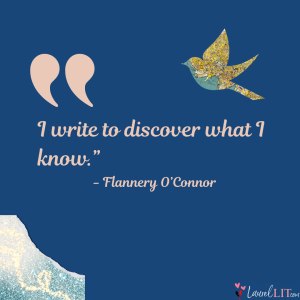
Connect with Other Writers
There is a whole community of writers out there who are going through the same struggles as you. Connect with them through online writing groups, or by attending writing conferences and workshops. A support system can provide you with motivation, encouragement, and valuable feedback.
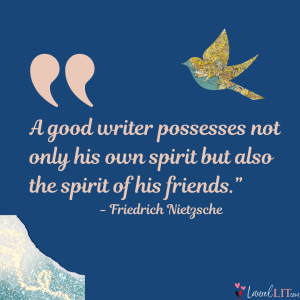
Celebrate Your Accomplishments
Remember to celebrate your wins, no matter how small they may seem. Did you finish writing a chapter? Great! Did someone post a five star review? Fantastic! Little victories keep us going.
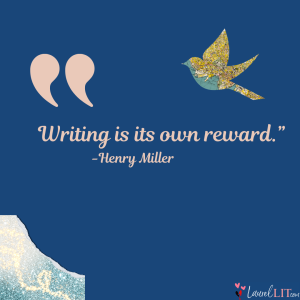
Remember that Failure is Part of the Journey
Every successful author has faced rejection and disappointment. They’re not indicators of your skill or talent; they are opportunities to learn and grow. Use them as motivation to keep writing and improving.
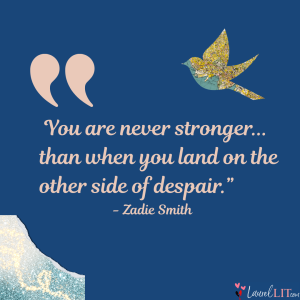
Believe in Yourself and Your Work
Be your own biggest cheerleader. Believe in yourself and your work, even when no one else does. Your stories have value and you have something unique to offer readers. Trust that your hard work and dedication will someday pay off.

Being an indie author is not easy, but it can be rewarding. Yes, the road to success may be long and bumpy, but with perseverance, you can achieve success. Stay motivated, keep writing, and believe in yourself and your work. Most importantly, don’t give up on your passion for writing.
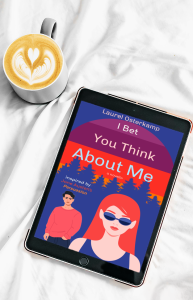

The post Need Some Author Motivation? This Will Help, Especially If You’re Indie! first appeared on LaurelLit.com.
The post Need Some Author Motivation? This Will Help, Especially If You’re Indie! appeared first on LaurelLit.com.
June 2, 2025
Fatal Flaws in a Rom-Com? Yes, Please!
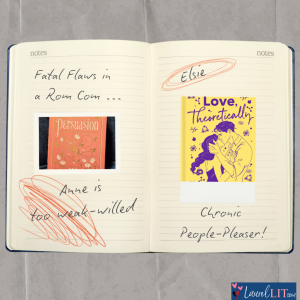
Ever since I was a kid in high school, studying Macbeth in my British Lit class, I’ve been enamored with the idea of a fatal flaw. All of Shakespeare’s tragic heroes have one. Macbeth is too ambitious; Romeo has a bad temper; Othello is jealous and insecure. Scholars still argue about Hamlet’s fatal flaw, but I say it’s indecisiveness. If Hamlet could just get over all his angst and decide which path to take, then most of his problems would be solved. Same is true for the other heroes.
Their fatal flaw led to their tragic downfall.This idea was not original to Shakespeare. He took it from the Ancient Greeks and their Elements of Tragedy. But Shakespeare’s tragedies brought the fatal flaw to the next level. They are known for both complex and flawed characters. These flaws are not random, but rather integral parts of the character’s personality that are exploited by the events of the story.
So how can we, as novelists, use this idea of the “fatal flaw” to develop our own characters, even in a light-hearted novel? The key is understanding how it can manifest in different ways and how it can be resolved through a character arc.
I’ve been thinking about this a lot, as I simultaneously read Persuasion by Jane Austen, and Love, Theoretically, by Ali Hazelwood. Both novels are light-hearted romances, albeit from very different eras. And both authors use the idea of a fatal flaw effectively. In Persuasion, our heroine Anne is too weak-willed. She lets others persuade her, and loses her chance at a loving marriage. In Love, Theoretically, Elsie is a chronic people-pleaser. She sacrifices her own happiness to please every person she encounters, and at times she even shifts her personality to meet the needs of others. This creates a hopeless situation, and Elsie must learn to overcome those tendencies.
After both Austen and Hazelwood established their characters’ “fatal flaws,” they used them to develop a character arc.That’s where the genius of each novel comes in. The arcs show the character’s growth and transformation as they confront and overcome their flaws. We see Anne learning to stand up for herself against her selfish family, and to show her feelings for Frederick Wentworth. We see Elsie let down her guard, expressing herself when she’s angry, and doing something very risky for her: disappointing others.
Neither of these light-hearted novels are as dramatic as a Shakespearean tragedy, and the stakes are not life and death. Yet the fatal flaws are still crucial to the character development and the novels’ plots. Additionally, as readers, we’re all able to relate.
We all have flaws and struggles, and it is through seeing these flaws in characters that we can connect with them on a deeper level. We root for them, we empathize with them, and we feel a sense of satisfaction when they overcome their flaws and grow as individuals. In a light-hearted novel, this can also be a source of humor and entertainment, as we see characters make mistakes and learn from them in amusing ways.
Thus, the idea of a “fatal flaw” found in Shakespeare’s tragedies can be a useful tool for novelists to develop a character arc, even in a rom-com. By understanding how a flaw can manifest in different ways and drive character growth, we create relatable and dynamic characters that will resonate with readers. So, no matter your genre, don’t shy away from the “fatal flaw.” It will make your characters seem human, and that’s when their journey becomes meaningful.
“Ali Hazlewood meets Jane Austen in this super-sweet rom com.” – A Contemporary Novella Inspired by PERSUASIONGet Your FREE Copy of I Bet You Think About MeThe post Fatal Flaws in a Rom-Com? Yes, Please! first appeared on LaurelLit.com.
The post Fatal Flaws in a Rom-Com? Yes, Please! appeared first on LaurelLit.com.
May 16, 2025
Swiftature — Top 50 Taylor Swift Songs for Fiction Writers Ranked: 30 – 21
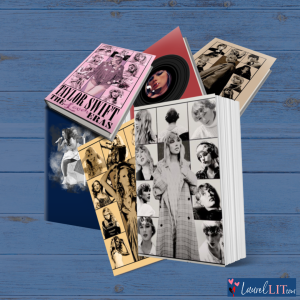
Hello, fellow Swifties/Authors! I had a lot of fun putting together my post for the top 50 Taylor Swift songs for fiction writers, 30-21. So, without further ado, let’s get to it!
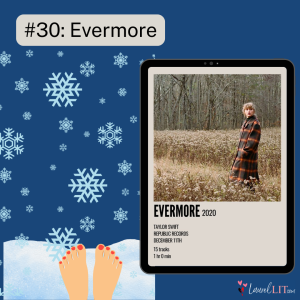
Hey December
Guess I’m feeling unmoored
Can’t remember
What I used to fight for
I rewind the tape but all it does is pause
On the very moment all was lost
Sending signals
To be double crossed
And I was catching my breath
Barefoot in the wildest winter
Catching my death…
The title song of Swift’s second surprise release in 2020, “Evermore” is pure poetry. It was hard to pick just a few favorite lines, because it’s full of profound and lyrical ways to represent depression. She personifies December by speaking to it directly. I’m assuming that “barefoot in the wildest winter” is both a metaphor and hyperbole. Then using a zeugma with “catching” both her breath and her death. In fiction, featuring a protagonist with depression and lacking a sense of agency is tricky. But in songwriting and in poetry, it’s both haunting and beautiful.
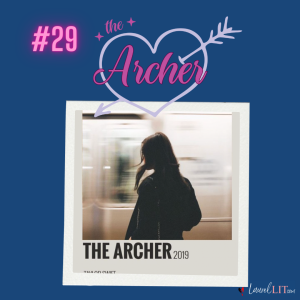
I wake in the night, I pace like a ghost
The room is on fire, invisible smoke
And all of my heroes die all alone
Help me hold on to you
I’ve been the archer, I’ve been the prey
Screaming, who could ever leave me, darling
But who could stay?
Taylor Swift admits that “The Archer” is a deeply personal song. She’s been an archer–someone who begins fighting from a safe distance. But she’s also been the prey; her fame invites a lot of scrutiny, at times making her feel trapped. The entire song is an extended metaphor and a glimpse into her mindset. For fiction writers, it can be instructive on how to build a character arc.
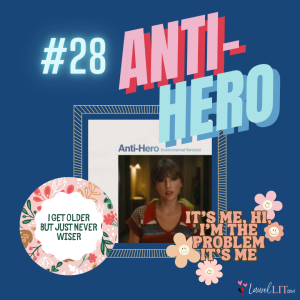
I should not be left to my own devices
They come with prices and vices
I end up in crisis (tale as old as time)
I wake up screaming from dreaming
One day I’ll watch as you’re leaving
‘Cause you got tired of my scheming
(For the last time)
It’s me, hi, I’m the problem, it’s me
At tea time, everybody agrees
I’ll stare directly at the sun but never in the mirror
It must be exhausting always rooting for the anti-hero
When I created my list, I didn’t realize that I put three seemingly autobiographical songs about depression and anxiety in a row. I chose “Anti-Hero” because that’s a common term in literature, referring to a villain who’s also the protagonist. They’re a bad person who’s also relatable, and the reader winds up rooting for them. Think Macbeth or Tony Soprano. Anti-heroes are relatable because most of us engage in self-loathing at times. And we also do bad things, knowing that they’re bad as we do them. Swift expresses that paradox so eloquently in this song that most people connect with it right away.
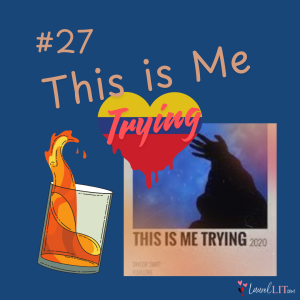
They told me all of my cages were mental
So I got wasted like all my potential
And my words shoot to kill when I’m mad
I have a lot of regrets about that
I was so ahead of the curve, the curve became a sphere
Fell behind all my classmates, and I ended up here
Pouring out my heart to a stranger
But I didn’t pour the whiskey
Okay, I guess I just added the FOURTH song in a row that’s about mental struggles and depression. But “This is Me Trying” reads like an apology, a plea to someone whom she longs for forgiveness. Swift has said that many of the songs on Folklore are fictional, and I wonder if “This is Me Trying” is one of them. To me, it is like a wonderfully angsty young adult novel, not just about finding love but also self-discovery.
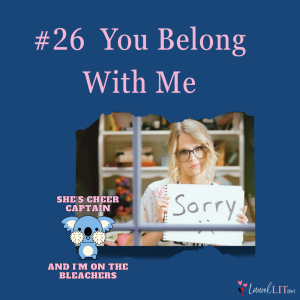
Walk in the streets with you and your worn-out jeans
I can’t help thinking this is how it ought to be
Laughing on a park bench, thinking to myself
Hey, isn’t this easy?
And you’ve got a smile that can light up this whole town
I haven’t seen it in a while since she brought you down
You say you’re fine, I know you better than that
Hey, whatcha doing with a girl like that?
Finally, at #26, “You Belong With Me” breaks the stretch of sad songs. If “This is Me Trying” is like an angsty YA novel, “You Belong With Me” is like a teenage friends-to-lovers rom-com. The story follows the three act structure flawlessly, and the relatable heroine is someone to root for. The perfect example of how something that’s peppy and fun can still be well written and beautifully executed.
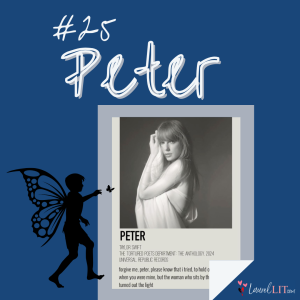
And I won’t confess that I waited, but I let the lamp burn
As the men masqueraded, I hoped you’d return
With your feet on the ground, tell me all that you’d learned
‘Cause love’s never lost when perspective is earned
And you said you’d come and get me, but you were 25
And the shelf life of those fantasies has expired
Lost to the Lost Boys chapter of your life…
“Peter” is one long reference to Peter Pan, which Taylor Swift uses to lament a lost love from her youth. I won’t speculate about who, in real life, this song is about. But in the fictional world of the song, Swift is Wendy, who burns her nightlight for Peter Pan, beckoning him to come find her. She tried not to give up faith that he’d arrive. Unfortunately, some of us must grow up, and when we do, those connections that seemed so strong when we were young fall away.
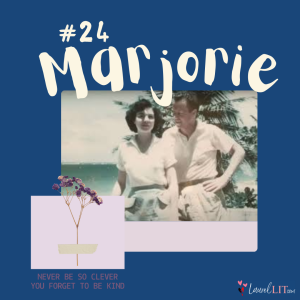
The autumn chill that wakes me up
You loved the amber skies so much
Long limbs and frozen swims
You’d always go past where our feet could touch
And I complained the whole way there
The car ride back and up the stairs
I should’ve asked you questions
I should’ve asked you how to be
Asked you to write it down for me
Should’ve kept every grocery store receipt
‘Cause every scrap of you would be taken from me
Watched as you signed your name Marjorie
All your closets of backlogged dreams
And how you left them all to me
There’s nothing fictional about “Marjorie.” Swift wrote the song about her grandmother, who was an opera singer. It’s a tribute and recognition from where Swift inherited both her talent and dreams. I place it right in the middle of my top 50 because it’s simple and beautiful and every time I hear it my heart aches and soars at the same time.
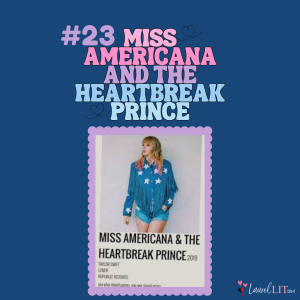
The whole school is rolling fake dice
You play stupid games, you win stupid prizes
It’s you and me, there’s nothing like this
Miss Americana and The Heartbreak Prince (okay)
We’re so sad, we paint the town blue
Voted most likely to run away with you
I’ll be honest–I had to Google this song to discover its meaning. Turns out “Miss Americana and The Heartbreak Prince” is an allegory! Swift uses high school as a metaphor for the political system. She’s “Miss Americana” – the all-American girl who represents everything that’s good and wholesome about the USA. But she’s heartbroken over the current political scene, and she’s expressing her disillusionment. Swift tells a surface level story about young love and rebellion that hides a deeper, darker meaning.
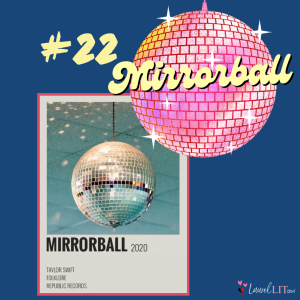
And they called off the circus
Burned the disco down
When they sent home the horses
And the rodeo clowns
I’m still on that tightrope
I’m still trying everything to get you laughing at me
I’m still a believer but I don’t know why
I’ve never been a natural
All I do is try, try, try…
Another song with hidden depths, which is ironic, since a mirrorball is by nature a shiny, reflective surface. Swift uses the metaphor of a mirrorball to represent herself in relationships, hinting at giddiness (“Spinning in my highest heels, love / Shining just for you”), precariousness (“I’m still on that tightrope”), and even toxicity (“to get you laughing at me”). It’s about desperation and imposter syndrome. Some say it’s about her compulsion to stay relevant to her fans; others claim it’s about holding onto a failing romance. Either way, it’s another surprisingly relatable song. Even Taylor Swift, who’s seemingly on top of the world, claims, I’ve never been a natural; all I do is try, try, try…
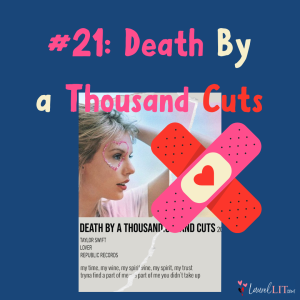
I dress to kill my time
I take the long way home
I ask the traffic lights if it’ll be all right
They say, “I don’t know”
And what once was ours is no one’s now
I see you everywhere
The only thing we share
Is this small town
You said it was a great love
One for the ages
But if the story’s over
Why am I still writing pages?
I’m struck by the personification of the traffic lights and how the narrator is living inside her head. It tells the story of a relationship that slowly died because the couple grew apart–it was no one’s fault, but that almost makes the heartache worse. Fun fact–Swift wrote “Death By a Thousand Cuts” after watching The Netflix film Someone Great. Thus, stories can work their way inside of us and inspire us to create something new. I love that.
Last time, I said I’d try to be back with the next post in less than a month, but it takes me a long time to put all this together. I’ll do my best, but in the meantime, you can revisit my rankings for the best Taylor Swift songs for fiction writers, #s 50-41. And, her best songs for fiction writers, #s 40-31. Also, make sure to read “Love and Poetry,” my short story written while reading Taylor Swift. It’s free to download, and you don’t even have to subscribe to my newsletter! (But if you’d like to subscribe, I’d love to have you. Click here!)

The post Swiftature — Top 50 Taylor Swift Songs for Fiction Writers Ranked: 30 – 21 first appeared on LaurelLit.com.
The post Swiftature — Top 50 Taylor Swift Songs for Fiction Writers Ranked: 30 – 21 appeared first on LaurelLit.com.
April 18, 2025
SWIFTATURE – TOP 50 TAYLOR SWIFT SONGS FOR FICTION WRITERS RANKED: 40 – 31

This project is more of an undertaking than I imagined it would be, when I came up with idea about a month ago. But it’s fun, so I’m sticking to it! So, here are the 40th thru the 31st best Taylor Swift songs for fiction writers. Let’s do this!
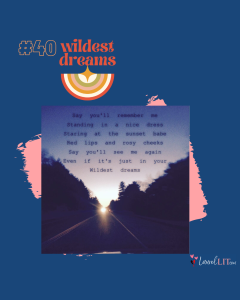
Say you’ll remember me
Standing in a nice dress
Staring at the sunset, babe
Red lips and rosy cheeks
Say you’ll see me again
Even if it’s just pretend
“Wildest Dreams” uses vivid imagery to combine romance and sensuality. On the surface, its narration is pleading, needy even. But dig deeper, and it seems like Taylor is shedding her “good girl” image and embracing her tryst with a “bad boy.” I love how she paints a picture through describing details like the sunset or the clothes he left behind in her room. And I think this song is a great example of a character arc. She’s shedding the belief that she must always make good choices.
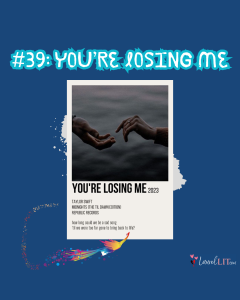
Do I throw out everything we built or keep it?
I’m getting tired even for a phoenix
Always risin’ from the ashes
Mendin’ all her gashes
You might just have dealt the final blow
Nylon Magazine calls “You’re Losing Me” Swift’s most devastating breakup song, and that’s saying a lot, since devastating breakup songs are Swift’s superpower. If you want an example of quiet desperation teemed with a sense of futility, look no further than “You’re Losing Me.” Plus, I love the phoenix reference–not the first time she implies that she’s come back to life multiple times.
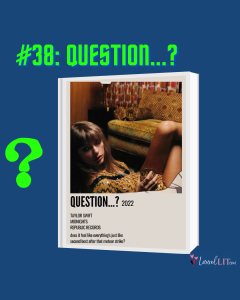
Big city, wrong choices
We had one thing going on
I swear that it was something
‘Cause I don’t remember who I was before you
Painted all my nights
A color I’ve searched for since
“Question” has a dream-like quality, even though there’s no mention of dreaming. Instead, she’s up late (as the song is from Midnights…), trying to figure out a confusing breakup. She’s posing the questions to her ex, while using lots of symbols and metaphors. My favorite is her use of color, which she does in multiple songs. “You painted all my nights a color I’ve searched for since…”
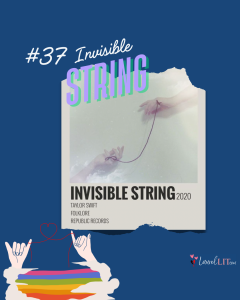
A string that pulled me
Out of all the wrong arms right into that dive bar
Something wrapped all of my past mistakes in barbed wire
Chains around my demons, wool to brave the seasons
One single thread of gold tied me to you
“Invisible String” is a happy song where Swift frames her previous mistakes in relationships as fortunate and necessary, because they lead her to a happy and healthy relationship. It’s based off an idea from a Chinese myth, where there’s a string that ties together a man and woman who are destined to be together. The entire song is a metaphor, using vivid imagery and again, color references. It’s like the perfect happily-ever-after epilogue to a love story.
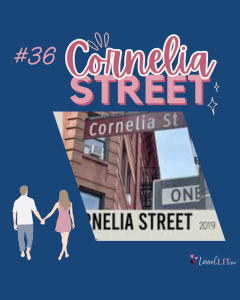
Windows swung right open, autumn air
Jacket ’round my shoulders is yours
We bless the rains on Cornelia Street
Memorize the creaks in the floor
Apparently, there’s major controversy over who “Cornelia Street” is about. Joe Alwyn? Matty Healy? Karlie Kloss? For me, it doesn’t matter. This song captures the heady sugar rush of first falling in love, plus the insecurity, the fear of losing your new relationship. The couple in this song has the type of intimacy that you dream about, where you get lost in the other person.
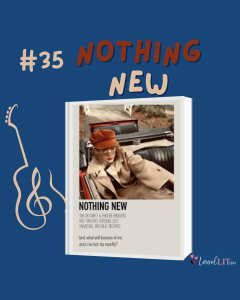
And my cheeks are growing tired
From turning red and faking smiles
Are we only biding time ’til I lose your attention?
And someone else lights up the room?
People love an ingenue
Any writing instructor worth their salt will insist that to write good fiction, you must first tell the truth. That is, good authors aren’t afraid of making themselves vulnerable, of putting their fears on the page for the world to see. “Nothing New” is startling in how vulnerable Swift makes herself. I expect there’s nothing fictional about this song, but it’s a great reminder of how to be brave in your writing.
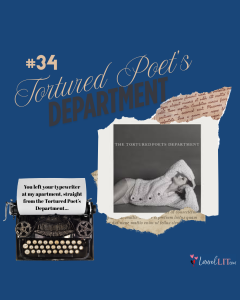
You left your typewriter at my apartment
Straight from the Tortured Poets Department
I think some things I never say
Like, “Who uses typewriters anyway?”
But you’re in self-sabotage mode
Throwing spikes down on the road
But I’ve seen this episode and still loved the show
Who else decodes you?
It’s easy to assume that “Tortured Poets Department” is about a new relationship, but it’s actually about thrill and drama between two angsty musicians. The genius stems from Swift’s self-awareness, recognizing that they aren’t “tortured poets,” but rather “modern idiots.” She sings about a fling that’s also overly intense–like, he’ll end his life if she leaves. But that’s okay, because he jokingly slipped a ring on her finger, and her heart was exploding! Swift captures the denial and addictiveness of being in a dysfunctional relationship.
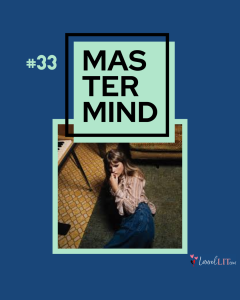
No one wanted to play with me as a little kid
So I’ve been scheming like a criminal ever since
To make them love me and make it seem effortless
This this the first time I’ve felt the need to confess
And I swear
I’m only cryptic and Machiavellian ’cause I care
“Mastermind” is like a super-villain origin story. Or, the surprise confession by a character who was hiding the fact that they’re the antagonist. Interesting that this song shares a similar theme with other songs on the Midnights album, like “Antihero.”
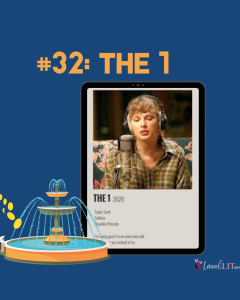
But we were something, don’t you think so?
Roaring 20s, tossing pennies in the pool
And if my wishes came true
It would’ve been you
In my defense, I have none
For never leaving well enough alone
But it would’ve been fun
If you would’ve been the one
“The 1” is, like many of Swift’s songs, about a relationship that ended a while ago. It’s a bittersweet reflection of what could have been, about the one who got away. I like the “roaring twenties” phrase, which sounds like she should be talking about the 1920s, but really must be a reference to being in your twenties. And how “tossing pennies in the pool,” leads to “if my wishes came true,” because who hasn’t thrown a penny in a fountain and made a wish? It’s a pretty song, nostalgic.
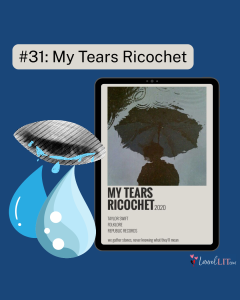
We gather stones, never knowing what they’ll mean
Some to throw, some to make a diamond ring
You know I didn’t want to have to haunt you
But what a ghostly scene
You wear the same jewels that I gave you
As you bury me
In “My Tears Ricochet,” Swift sings about betrayal. It’s a haunting song that blends desperation with resignation through showing rather than telling. She’s offering her surrender, and uses death metaphors to convey her feelings of betrayal, as she realizes she never deserved such treatment. The coolest part is how she suggests that her betrayer will carry this burden of guilt forever, that he harms himself whenever he harms her or anyone he loves. So, both their tears will metaphorically ricochet back and forth, and Taylor’s warning him of the impact.
Hopefully it won’t be another whole month before I post songs 30-21. But in the meantime, if you’re getting anxious, make sure to read “Love and Poetry,” a short story written while reading Taylor Swift. It’s free to download, and you don’t even have to subscribe to my newsletter!

The post SWIFTATURE – TOP 50 TAYLOR SWIFT SONGS FOR FICTION WRITERS RANKED: 40 – 31 first appeared on LaurelLit.com.
The post SWIFTATURE – TOP 50 TAYLOR SWIFT SONGS FOR FICTION WRITERS RANKED: 40 – 31 appeared first on LaurelLit.com.
Laurellit.com
- Laurel Osterkamp's profile
- 523 followers


